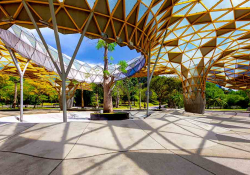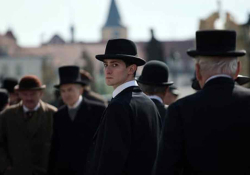The following essay is adapted from a talk given at the symposium honoring Han Shaogong, winner of the 2011 Newman Prize for Children’s Literature, at the University of Oklahoma in February 2011. To read Han’s acceptance speech, click here, and read more about the prize in the July 2011 issue of WLT as well as at the website of OU’s Institute for US-China Issues.
Han Shaogong found the roots of his writing deep beneath the ground in the southern Chinese countryside, in the days of the Cultural Revolution, even literally so. Toward the end of A Dictionary of Maqiao, Han recounts how he, as one of Mao’s millions of “rusticated youth,” had to help the peasants of Maqiao, a tiny village in Hunan Province, dig air-raid shelters. One day, in a dark and narrow underground cave, Fucha, the local accountant, decides that they have done enough work for the day, and says with a sigh of relief, “Let’s get the bad air out of us, let’s have some empty talk.” He tells Han a ghost story, eventually scaring the wits out of himself, when suddenly a mysterious thumping noise is heard. Have they really found ghosts? Or could they have been digging so far, he asks Han, his imagination running free, that they have reached another world?
What the people of Maqiao call “empty talk,” Han explains in this penultimate entry of his Dictionary, is actually gossip: “an activity designed for passing the time, one that took place mostly on evenings or on rainy days,” when everyone “curled up in groups” for “the contented exchange of nonsense and tall stories.” Surprisingly, their dialect word for “empty talk” is baihua, which means vernacular, plain language, in standard Mandarin. In China, as in cultures around the world, the beginnings of literary fiction are marked by a switch from the classical language to the vernacular, which leads Han “to suspect that the beginnings of Chinese vernacular literature sprang from beneath gloomy thatched eaves such as were found here, that its roots lie in sources of vulgar diversion, in the records of the fantastic and bizarre, even in tales of horror.”
Indeed, even today, fiction is still called xiaoshuo in Chinese: “small talk,” a term that has been used to designate everything from the earliest supernatural stories to the romances (chuanqi) of the Tang dynasty and Pu Songling’s famous Strange Tales from Make-Do Studio that so enchanted Franz Kafka. As Han’s own first attempts at fiction writing were inspired by the Maqiao villagers’ evening chitchat, he modestly concludes, his own work can rightfully be called xiaoshuo: mere trivial storytelling in the traditional sense of the word.
In 1985, when Han Shaogong first wrote about his discovery of the Chinese literary tradition in an essay called “Literary ‘Roots,’” he struck a chord in literary circles. The mid-1980s were a period of “culture fever” in which, after thirty years of cultural erosion under Maoism, artists were trying to reconnect to precommunist or even premodern Chinese culture. In this atmosphere, Han’s essay, which soon gave rise to heated debates on literary “root-seeking,” was taken by many as a nationalist, conservative plea for the revival of indigenous tradition. To be sure, Han drew inspiration from the regional customs, legends, and beliefs of the area to which he was “sent down,” largely preserved in ethnic minority cultures less influenced by revolution and modernization. But he was also making a more general plea for Chinese literary creativity.
To him, the rupture in tradition caused by the political isolation introduced by Maoism, and previously by the New Culture Movement of the early twentieth century, had created a vacuum in Chinese culture, leaving it overrun by superficial modern influences. Writers felt “uprooted” and therefore lacked self-confidence. On the one hand, Han saw many of his peers producing shallow imitations of Western literature (which they often read in poor, hasty translations); on the other, he saw a preoccupation with writing about urgent, sociopolitical issues, while not delving into the deeper, cultural layers of humanity.
Southern Chinese culture provided a way out of both problems. In Han’s view, the ethos of this half-primitive, holistic culture—where instinctive thought reigns and where the rational is mixed with the nonrational—is more profound and conducive to artistic production than the northern, neo-Confucian culture. While the latter is preoccupied more with moral edification and practical rules of conduct, the former has always been associated with the spiritual, playful tradition of Taoism, and especially with its main literary exponent, the “savage sage” Zhuangzi.
If Han’s early fictional work still betrays influence of the political novel in vogue in the late 1970s, his stories and novellas written around 1985, such as “Homecoming?”, Pa Pa Pa, and Woman Woman Woman, are so permeated with Taoist relativity that they transcend any straightforward social commitment. For example, “Homecoming?,” a haunting story of an identity crisis, is a modern variation on Zhuangzi’s famous parable of the butterfly dream: was Zhuangzi dreaming of a butterfly, or was a butterfly dreaming of Zhuangzi? But it was not until his first full-length novel, A Dictionary of Maqiao, published ten years later in 1996, that Han began to fully explore this relativity by focusing on the ambiguity of language.
Not only did the dictionary form prove quite suitable for Han’s playing with the relativity of language, it fitted his writing style, bringing together Han Shaogong the fiction writer and Han Shaogong the thinker-essayist. Many entries contain words and expressions of the Maqiao dialect that seem to turn common sense upside down: for instance, “awakened” means stupid, “asleep” means clever, and to be “scientific” is to be lazy. To make sense of it all, Han consults existing dictionaries, he muses and philosophizes, and, most importantly, he tells stories about how the villagers use their language. This playful blending of novel and dictionary seems to have enabled him to combine contemplative and narrative prose, which to him is “the soul of the book.”
This freedom of writing, says Han, is in itself also inspired by the book of Zhuangzi, which comprises philosophy, history, and fiction, following the much wider notion of literature (wen) in classical China. His decision to write in this way, therefore, is nothing less than an attempt to break away from certain aspects of the mainstream realist novel, most specifically its requirements of a dominant plot and character development, which to him are products of late-nineteenth-century Western influence. He voices his rejection of such things in one of the dictionary entries, “Maple Spirit,” in which he says he would prefer to write about every single aspect of Maqiao, subsequently devoting the entry solely to two maple trees.
In the West, the mainstream realist novel has also been challenged by the modernist novel, rejecting chronology and psychology in an often fragmentary narrative. But Han mounts his personal rebellion against the form by harking back to the premodern Chinese novel. After all, the absence of a unilinear plot is a typical element of traditional Chinese novels, which have often been characterized as mere accretions of short narratives, with a heterogeneous and episodic plot style, containing many characters, and even showing a tendency toward encyclopedism—all characteristics, incidentally, that often trouble Western readers, as prolific translator Howard Goldblatt has remarked.
Han’s “encyclopedic” dictionary form can thus be seen as a creative middle course between short and long narrative. However, A Dictionary of Maqiao is not simply a traditional novel, the key difference being Han’s role as a narrator. In the entries, he often doubts the provisional, hypothetical nature of his understanding of certain dialect words, and often resorts to using his own imagination. Although in classical fiction the narrator was free to intrude and lecture and moralize on various subjects, his was never a true subjective voice such as Han’s first-person narrator’s. His book may have some resemblance to traditional literati collections of remarkable anecdotes about the countryside, but the fact that he interacts with the country-dwellers—his stories’ characters—rather than placing himself above them, gives his writing a distinctly modern quality.
The fact that A Dictionary of Maqiao, a novel with so many traditional elements, has been considered by both its author and Chinese readers as an unconventional experiment lays bare the far-reaching influence of Western literature in China over the twentieth century. It has made modern Chinese readers consider the Western novel as a standard form, even though it is of recent vintage in China. In that sense, A Dictionary of Maqiao can indeed be seen as a product of literary root-seeking. That is, root-seeking perceived in the way Han Shaogong had originally articulated it: an effort to break through the shallow outer crust of the politically engaged and Western-inspired modern Chinese novel, in search of the richness and vitality of the soil beneath it.
Moreover, if one looks at how the contemporary Chinese novel has evolved in the past twenty-five years, this search may well have become a wider tendency. Even writers of the late-1980s avant-garde, once praised for their international, postmodernist attitude, have turned to the “looser” structure of the typical Chinese novel, as Yu Hua has called it. Interestingly, Su Tong and many other writers have published series of interlinked short stories centered on a homeland, as yet another type of intermediate form between long and short fiction. According to Mo Yan, former Newman Prize winner, this free, erratic style simply “reflects life,” in all its unpredictability. It seems that Han Shaogong’s gut feeling was right after all: after having soaked up its share of Western influences, Chinese literature is turning toward its own sources of creativity.
Leiden, Netherlands










